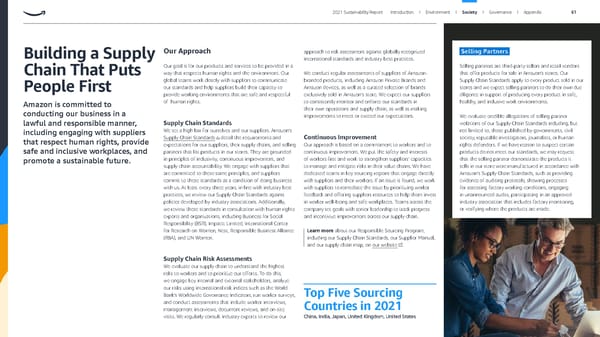Building a Supply Chain That Puts People First Amazon is committed to conducting our business in a lawful and responsible manner, including engaging with suppliers that respect human rights, provide safe and inclusive workplaces, and promote a sustainable future. Our Approach Our goal is for our products and services to be provided in a way that respects human rights and the environment. Our global teams work closely with suppliers to communicate our standards and help suppliers build their capacity to provide working environments that are safe and respectful of human rights. Supply Chain Standards We set a high bar for ourselves and our suppliers. Amazon’s Supply Chain Standards detail the requirements and expectations for our suppliers, their supply chains, and selling partners that list products in our stores. They are grounded in principles of inclusivity, continuous improvement, and supply chain accountability. We engage with suppliers that are committed to these same principles, and suppliers commit to these standards as a condition of doing business with us. At least every three years, in line with industry best practices, we review our Supply Chain Standards against policies developed by industry associations. Additionally, we review these standards in consultation with human rights experts and organizations, including Business for Social Responsibility (BSR), Impactt Limited, International Center for Research on Women, Nest, Responsible Business Alliance (RBA), and UN Women. Supply Chain Risk Assessments We evaluate our supply chain to understand the highest risks to workers and to prioritize our efforts. To do this, we engage key internal and external stakeholders, analyze our risks using international risk indices such as the World Bank’s Worldwide Governance Indicators, run worker surveys, and conduct assessments that include worker interviews, management interviews, document reviews, and on-site visits. We regularly consult industry experts to review our approach to risk assessment against globally recognized international standards and industry best practices. We conduct regular assessments of suppliers of Amazon- branded products, including Amazon Private Brands and Amazon devices, as well as a curated selection of brands exclusively sold in Amazon’s store. We expect our suppliers to consistently monitor and enforce our standards in their own operations and supply chain, as well as making improvements to meet or exceed our expectations. Continuous Improvement Our approach is based on a commitment to workers and to continuous improvement. We put the safety and interests of workers first and work to strengthen suppliers’ capacities to manage and mitigate risks in their value chains. We have dedicated teams in key sourcing regions that engage directly with suppliers and their workers. If an issue is found, we work with suppliers to remediate the issue by prioritizing worker feedback and offering suppliers resources to help them invest in worker well-being and safe workplaces. Teams across the company set goals with senior leadership to track progress and incentivize improvement across our supply chain. Top Five Sourcing Countries in 2021 China, India, Japan, United Kingdom, United States Learn more about our Responsible Sourcing Program, including our Supply Chain Standards, our Supplier Manual, and our supply chain map, on our website . Selling Partners Selling partners are third-party sellers and retail vendors that offer products for sale in Amazon’s stores. Our Supply Chain Standards apply to every product sold in our stores and we expect selling partners to do their own due diligence in support of producing every product in safe, healthy, and inclusive work environments. We evaluate credible allegations of selling partner violations of our Supply Chain Standards including, but not limited to, those published by governments, civil society, reputable investigators, journalists, or human rights defenders. If we have reason to suspect certain products do not meet our standards, we may request that the selling partner demonstrate the products it sells in our store were manufactured in accordance with Amazon’s Supply Chain Standards, such as providing evidence of auditing protocols, showing processes for assessing factory working conditions, engaging in unannounced audits, participating in an approved industry association that includes factory monitoring, or verifying where the products are made. 2021 Sustainability Report Introduction I Environment I Society I Governance I Appendix 61
 ESG Report | Amazon Page 60 Page 62
ESG Report | Amazon Page 60 Page 62